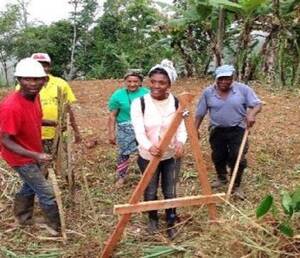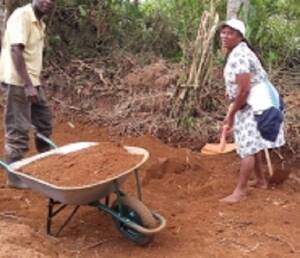Conservation of soil quality in the Mé-Zochi District in São Tomé and Príncipe

Project Symbol: TCP/STP/3502
Support for conservation and improvement of soil quality in the Mé-Zochi District
In order to increase its food production, the Republic of São Tomé and Príncipe has to face a double challenge: to diversify its agricultural production and to preserve its production factors in a sustainable way, especially the cultivable soils, which are scarce, often fragile and difficult to access. The objective of this pilot project was to improve food and nutritional security and household incomes through the dissemination of techniques for the development and cultivation of sloping soils, which constitute the majority of cultivable land.
BACKGROUND INFORMATION
Organizational Results SO2: Intensify and sustainably improve the supply of goods and services from agriculture, forestry and fisheries.
Regional priority area/initiative: The project contributes to poverty reduction which will contribute to achieving MDG number 1
Priority area 1: Promote sustainable and diversified agriculture whose products reach organized and remunerative markets by the adoption of good agricultural practices by all categories of producers.
Outcome(s) of the Country Programming Framework: The project is in line with priority area 1 of the PSC which is "promoting sustainable and diversified agriculture whose products reach organized and remunerative markets through the adoption of good agricultural practices"
Actual EOD: 1 December 2015
Actual NTE: 30 November 2017
Total Budget: USD 342,000
Soil fertility maps in peri-urban agricultural areas in São Tomé and Príncipe

Project Symbol: TCP/STP/3604
Support for updating soil fertility maps in peri-urban agricultural areas in Sao Tome and Principe
Over 80 percent of Afghanistan’s population lives in rural areas, where the main income comes from agricultural production. On-farm management practices are often highly extensive, putting the country’s soils under intense pressure and causing various types of degradation. Available data on Afghanistan’s soils are limited and earlier soil surveys have lacked a systematic approach and standardized methods. Sustainable soil management requires systematic soil data collection through field surveys and the continuous monitoring of soil properties organized into an appropriate data base and soil information system (SIS). The creation of such a system, providing accurate and up-to-date soil information, is thus a high priority, as it will enable sustainable land management at farm level and assist in the efficient monitoring of land degradation processes. Once in place, the Afghanistan Soil Information System (AfSIS) will contain data and information relating to the spatial variability of soil types and soil properties integrated with such natural co-variables as climate, vegetation, geology, relief conditions, hydrology and hydrography. It can be continuously upgraded and extended with new information from the field and will serve as a reference centre for storing all valuable soil data. The aim of the project was to identify, collect, evaluate, synchronize and systematize existing soil and non-soil data into a geodatabase integrating the various data sets. The data stored will enable the application of digital soil mapping (DSM) tools and models for the prediction of spatial distribution of soil properties, the identification of possible threats and pressures, risk assessment and the implementation of measures to mitigate soil degradation processes. The project would also strengthen the technical capacities of the country’s soil science community in the conduct of systematic and standardized field and laboratory soil properties analyses.
BACKGROUND INFORMATION
Strategic Objective/Organizational Result: This project contributes to the strategic objective SO2 which aims to make agriculture, forestry and fishing more productive and more sustainable
Regional initiative/Priority area: This project is in line with regional priority RI2 which aims at improved management and governance for the sustainable use of natural resources and which was defined at the 27th FAO regional conference for Africa held in Brazzaville in the Republic of Congo in April 2012. It also contributes to the achievement of priority axis 2 which recommends supporting the sustainable development and management of natural resources and which was defined during the consultation workshop on the sub-regional priorities of Central Africa held from 08 to 09 December 2015 in Libreville in the Gabonese Republic.
Result of the Country Programming Framework: In relation to STP's PSC, this project contributes well to priority area II which is favorable to sustainable management of natural resources.
Actual EOD: January 2017
Actual NTE: December 2018
Total Budget: USD 461, 000
